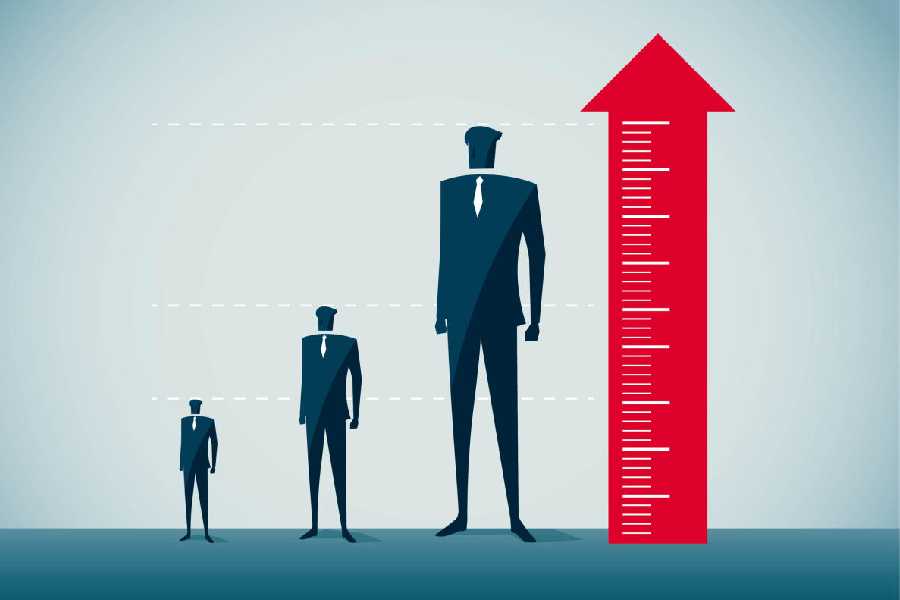Height matters
Sir — The TikTok song, “I’m looking for a man in finance, trust fund, 6’5”, blue eyes”, plays to society’s perceived norm of tall, strong and dominant men. Tinder, the online dating app, seems to have taken a cue from the TikTok trend by introducing its latest test feature that lets users set their height preferences for potential partners. But such a filter, it is feared, will enhance fixation on just physical attributes of the potential match. According to research, most women prefer to date taller men, while men prefer their women partners to be shorter. Dating apps were initially designed to be equalisers that enable singles to find love based on common interests. Will narrowing down the idea of a perfect match help one find his or her true love?
Sadiya Zahid,
Calcutta
Crucial exercise
Sir — The decision of the Union government to kick-start the much-delayed decadal census exercise is welcome (“Govt declares census, caste count in phases”, June 5). The census was due in 2021 but was postponed, citing the Covid-19 pandemic. Timely and accurate data form the basis of policies. The continuing absence of census data has hindered policymaking.
Census 2027 will include the enumeration of caste for the first time since 1931. While the census has previously included data on scheduled castes and scheduled tribes, this will be the first time it will gather comprehensive caste data extending beyond those classifications. This is welcome.
M. Jeyaram,
Sholavandan, Tamil Nadu
Sir — Even though the Covid-19 pandemic was used as an excuse to delay the census, the Centre conducted other political engagements, such as elections, during the pandemic years. The collection of correct caste data in the upcoming census will play a crucial role in the delimitation exercise before the next general elections.
Sukhendu Bhattacharjee,
Hooghly
Sir — The first synchronous census in India was conducted in 1881 and, since then, censuses have been conducted every decade without interruption till 2011. The announcement of Census 2027 comes months ahead of a crucial election in Bihar (“At last”, June 6). The delay in conducting the census had significant negative consequences, exacerbating inequality and hindering proper economic planning.
India faces severe challenges in administrative readiness. The census is a large-scale undertaking and will involve the mobilisation of census officials across the country for data collection. Perhaps the government can consider the use of Artificial Intelligence for faster enumeration as well as for ensuring efficiency.
Jayanta Datta,
Hooghly
Essential activism
Sir — I vehemently disagree with Sanjeev Bikhchandani’s view that liberal arts and activism are separate entities (“Active separation”, June 7). Activism is an integral part of human existence and is very important for democratic functioning. Freedom of expression is a fundamental right enshrined in the Constitution.
It is incumbent upon the intellectuals to analyse phenomena that reflect prevalent social and political situations. The dissenting comments made by A.K. Mahmudabad, a professor of Ashoka University, are thus justified. However, over the last few decades, public movements have become biased and politically motivated, causing erosion of trust of the masses in liberals.
Asim Bandopadhyay,
Howrah
Sir — The students protesting in American university campuses against Israel’s attack on Gaza were silent when hundreds of Israelis were killed in 2023 by Hamas. Student protests across the United States of America have been partisan and do not reflect true activism. Activism should be inclusive and incorporate the views of both sides in a conflict.
Rajib Bhattacharyya,
Calcutta
Stern advisory
Sir — “An intellectual civil war” by Debashis Charabarti (June 7) is a bold advisory to the authoritarian leaders across the world to abstain from attacking educational institutions and destroying scholarly pursuits. The universities in the United States of America have been a guiding light in academia. Instead of curtailing economic support, the US government should find ways to strengthen educational pursuits. The cuts in funding for research will harm the polity.
Brij B. Goyal,
Ludhiana
Elusive education
Sir — The rising cost of education prevents children hailing from poor families from continuing with their studies. They end up joining the workforce at a young age. Most poor students do not get to go to college because of the scarcity of resources at their disposal. The government must provide these students with free higher education so that they can lead better lives free of exploitation.
Nadim Dhakiya,
Amroha, Uttar Pradesh
Humble bag
Sir — It was very interesting to learn that the jhola, an inexpensive Indian bag, is being sold for an astronomical sum in the United States of America on a premium shopping website (“Bag and baggage”, June 8). This reminded me of the Bengali adage, ‘Gneyo jogi bhikh pay na’ (valuable things seldom get appreciation in their home countries).
Sourish Misra,
Calcutta
Sir — Jhola, the indigenous cloth bag of India, has a fascinating history of evolution. Despite spatial diversities, the jhola has found its way to the US as a sophisticated commodity. Poor Indian women can be seen carrying cloth bags called putulis in which they keep their bare necessities like muri and fruits.
Tapomoy Ghosh,
East Burdwan










